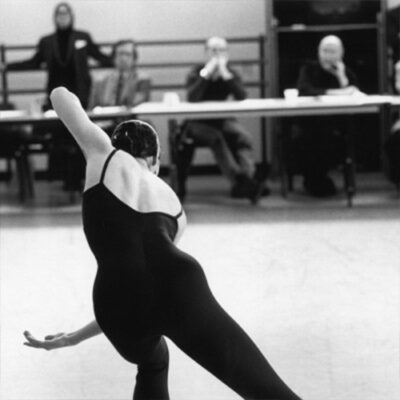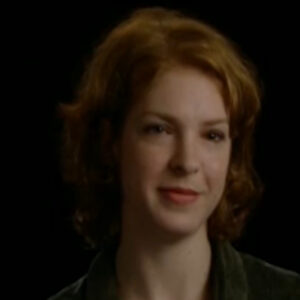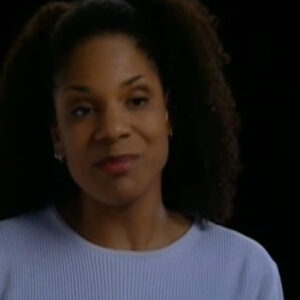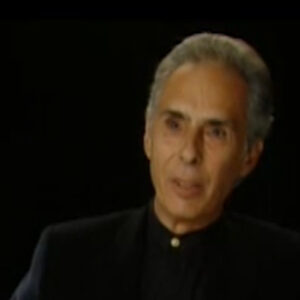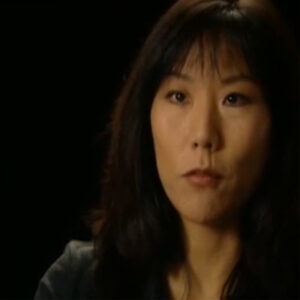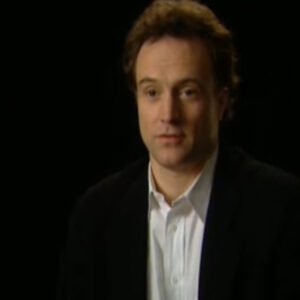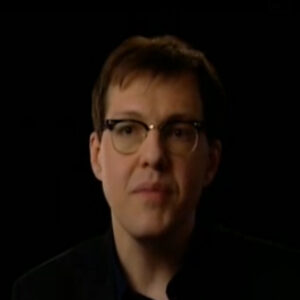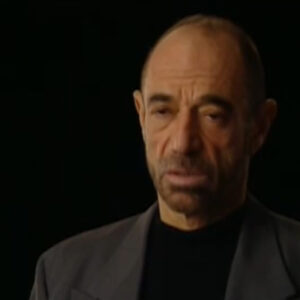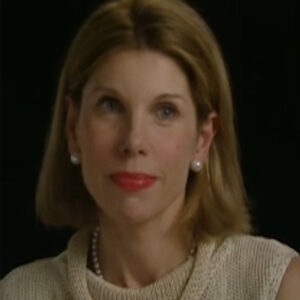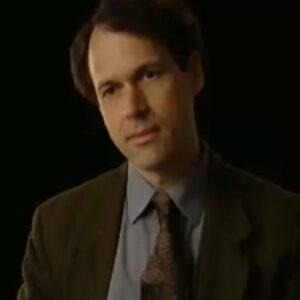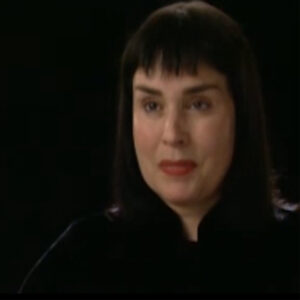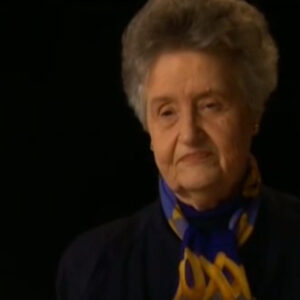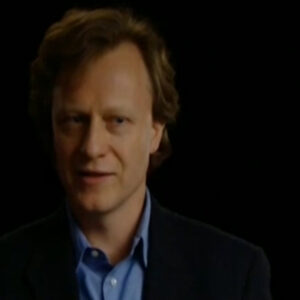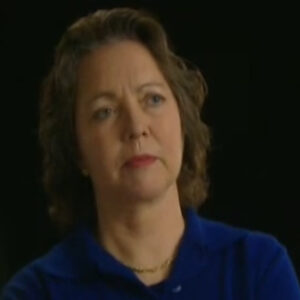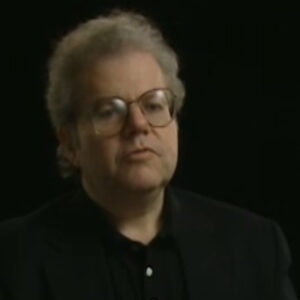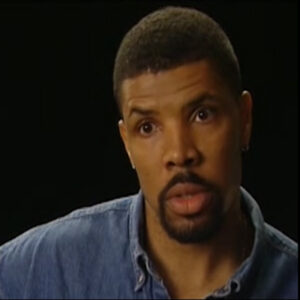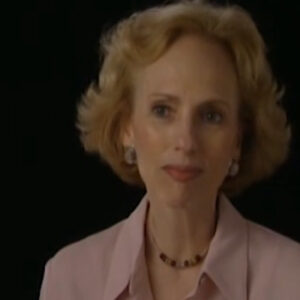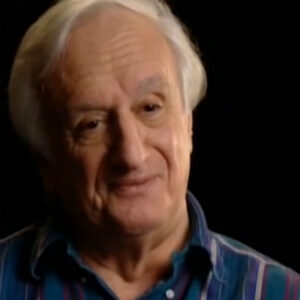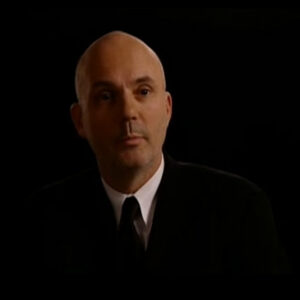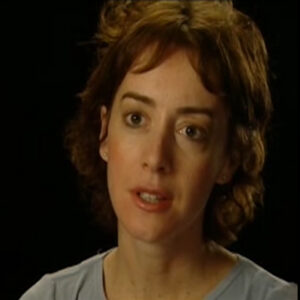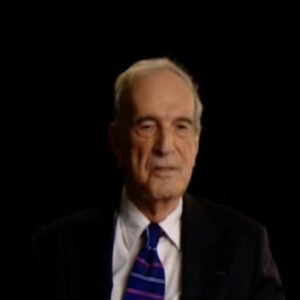Speaker I would I had gone to Indiana University to study music with the thought in the back of my head of maybe taking an acting class because I’ve been in the school play my senior year and rather enjoyed it. And this is what I did. And while I was studying music for the first two years of my college career at Indiana, I was also sort of hanging out with a lot of actors and trying out for plays and getting little parts and working up to bigger parts. And after a couple of years, I thought, you know, these are both 24 hour a day kind of discipline and I’d better choose one. So I chose the easier one acting and actually wasn’t easy at the time. It seemed actually more impossible. It was just that I could I could see my future as a as a concert pianist and composer, which is what I was interested in doing and conducting. And it was a very bleak future with mediocrity written all over it. And whereas I couldn’t see the end of the tunnel with acting, it was this enormous dark void into which I was ineluctably drawn. Meanwhile, once I had made this kind of vocational decision to pursue the art of the drama, the Vietnam War was raging and my draft board wouldn’t let me switch to a proper acting school. So I had to finish out my my four years at Indiana, after which the lottery was imposed and the cut off number the first year was 195 and I was 196. And that’s how come I got to go to drama school. In one piece. I came to New York, auditioned much to my surprise, got in and realized later I got in because there was a slot open for that from my type, if you will. It was almost because it was the first graduating class. And because John Houseman, I put a lot of special care into the choice of the actors in the first group. And as you approached the fourth year of the training program, it becomes much more oriented towards performance and full scale productions with sets and costumes and the like. Whereas the first two years of pretty much working in the studio with no sets or props or, you know, just working on raw acting. So it turns out they needed my type and I did an all right audition, apparently, and I got in and I got in as an advanced student, which means you joined the third year of the four year program. So I joined the group one. And it was very strange. There were there were three of us, Mary Jo, Negro, David Stiers and I. And you just sort of added in to this already volatile mix. There are a lot of funny looks like who are you?
Speaker Which parts of mine are you going to be taking away now that you’re here and things like that, all in good, good, good natured fun with looks that could kill.
Speaker But anyway, so that’s how that’s how I got in. I auditioned I had auditioned actually two weeks before for the TKG auditions, which were the theatre communications group, which is various universities and drum programs would send four or five handpicked students to go to these auditions at which all the regional repertory companies would come and look for new talent. And I went up to Chicago for that and was bounced. I didn’t get past the first cut. And ironically, the woman who cut me, Rosemary Tischler, who I ended up working with down at the Public Theater, is as an associate producer. I loved reminding her that she had cut me and made me think I can’t act. I might as well give up. But in a way, the fact that I had failed so thrillingly at the TKG auditions kind of loosened me up for my Juilliard audition. I decided, well, I. Yes, you know, the fact that I was getting good parts in college, I was just a fluke, I really can’t act, so I might as well just go to the audition anyway and just have fun. And so I was a bit looser and I also chose different material.
Speaker And I guess that’s how I got in.
Speaker You wanted the short answer, didn’t you? Gotcha. No, not at all. I never did.
Speaker The audition process, of course, is so it’s so scary for most people. Every time someone tells me they got in and they told me they didn’t think they were going to get it and they didn’t care because if they really cared.
Speaker Yeah, no, that’s one of the ironies or paradoxes of acting is you have to care and not care.
Speaker I suppose the same in any performing discipline. If you care too much, then you you you know, it’s very worked and overwrought. And there’s this other thing happening which is saying, how am I doing, dude, you like me? Can I get into your school? And you see that whether you’re auditioning or in performances, it has to be it has to be a certain kind of. Insouciance or nonchalance about the whole thing, as well as this incredible focus and concentration and sheer will and commitment, but I had this kind of I decided there was no I didn’t have a prayer. So it kind of I had a bit of fun, I think.
Speaker What did you know, I mean, this program was so new, I mean, a program in New York here all the way to the end, it existed only for two years.
Speaker Yeah. What was the lure? I mean, how are they even getting the word out to school? Is Juilliard exists? I mean, was it the has been reputation? I mean, what what what was.
Speaker No, I am I think my sister had sent me something she’d cut out of Newsweek magazine or Time or something, a little article about this new school and saying this is where you should go if you really want to learn to act. And then there was a bit of buzz around the drama department at Indiana about it. You know, little brochures were starting to leak. And I think and it just seemed like with Michelle Santoni and John Houseman and the whole idea behind the school of wanting to train American actors in the classics as well as contemporary, but to include in a major way the classical training, as Sandy had done in in in France and then through his productions in England with Olivier and Gielgud and the like, and then having founded the National Theatre School in Canada. So his reputation and John Houseman’s, I think were pretty compelling lures for any young actor.
Speaker You know, somebody actually died at seventy 71 to one year after you would have been there. But did you cross paths with him yourself?
Speaker I got there in time for his memorial. There was there was a memorial service and a lot of his old students. Spoke and it was a very interesting and and moving memorial, and in fact, I remember one of the things that I forget the actor, but he said something about because there were a lot of a lot of the drama students there saying that what he learned in drama school, understanding he was not he couldn’t really sort of assimilate it all for years to come. And I found that that truth to be borne out in in my experience as well. You you don’t graduate from the Juilliard Drama School as a finished actor. And in a way, you graduate knowing how much there is to know, which I guess any good education teaches one. But but you also then have to spend years unlearning bad habits that you got into in drama school, a certain life lessons more like life working, lessons that you can only learn from doing it professionally. Although I have often thought that getting up in front of an acting class and doing a scene is much harder than an opening night on Broadway. With all of the first string critics there, there is no one more critical or hypercritical or severe in their damnation of you than your fellow acting students in an acting class. You are laying it on the line. And if you were either going to tell the truth or be damned for lying and I remember there was a wonderful refrain because once I mean, all through drama school, if if two actors got into a quarrel about something, about the nature of anything, the last refrain and the final sort of coup de grace, the last turn of the knife and the already open wound was and that’s what’s wrong with your acting, too.
Speaker You know, it’s like year this year that and it’s what’s wrong with your acting. And that was the most unkind cut of all of you.
Speaker Impugn my work. But, yeah, those those acting classes who they were hard. And I still don’t think anyone at Juilliard knows. But I went through the two of my two years there without ever doing an emotional recall. No, an emotional recall is where the teacher says, OK, whoever is ready can get up and do an emotional recall where you had to get up and relive through the telling some deeply traumatic or otherwise dramatic incident in your life that sort of reduced you to gelatinous whatever either tremendous rage or great usually was a breakdown kind of thing. And I’d sort of like people would raise their hands and I’d give them maybe next week I’ll do it next year. I never had to do it, but I have had to do it subsequently. And I always felt it was like I snuck through without having done my emotional breakdown. And I found myself in, you know, a few movie sets or preparing to do certain things and time. I got to do it now on my own because I’m going to have to actually do that dumb acting exercise because I’m having a little problem here. But it’s one thing to do an emotional recall in your own living room and something else to do in front of your fellow actors.
Speaker We’ll talk a little bit about that, that the whole group idea, because, you know, I don’t know if you need to. Other drama school.
Speaker That’s certainly been true. Juilliard from day one that you stay in this group, this group philosophy.
Speaker We’re all I mean, it’s like they’re all sort of like naked in front of each other by the third year, which is now. And I’m following it’s like, God, they’ve seen everything about I mean, they’re way beyond their acting and into, you know, half of them have been in and out of fights, in and out of love, in and out of. I mean. Yeah, how does I mean and you came into a group that was probably quite you say, not happy to see not having to have their parts stolen. But I mean, talk about that kind of camaraderie and why is it set up like that?
Speaker What is I think I don’t think it’s necessarily particular to Juilliard. I think any school when you start freshman, your sophomore year, etc, you sort of tend to stay with the same, your contemporary group.
Speaker Oh, no, that’s not true. No, when you would know exactly when I would spend a second year. Precisely. Yeah, they do. Well, they that’s it’s not the policy, but we’ve done it.
Speaker I remember when I was there, even we had to fill out some, you know, spear carriers. There was some small parts with members of the class below us there. Our two classes for people there. Yeah. Yeah. Just someone to swell as seen. The idea of ensemble was something that was stressed. But I have to say, I never felt it in any way, perhaps because I missed that first two years. And from what I gathered, having joined the third year, the people. Oh, you missed, you know, the stripping away part where apparently part of the the plan that Michelle Santoni had had. Instituted was that the first year you kind of tear down everything or tear away everything or you kind of get to the raw acting source, whatever that is, and in so doing, it’s pretty brutal. So I miss the fact that brutalisation, apparently, where you’re really I mean, the first the first thing you do there is the test and you’re asked to play King Lear or they divide up the part of Hamlet. You know, you’ll play the first act. You do the second act playing roles that you’re nowhere prepared or near, ready to play and just to sort of cut your teeth on it and see sort of what what there is to learn. And William, when I was there, there was there is this you are in front of a jury. You are being assessed and criticized and. I almost said nurtured in a way you are, but it’s it’s not always it’s not you’re not being coddled. And this idea of ensemble, yes, we were an ensemble and in fact, it was one of the most amazing ensembles that could on an opening night when you thought this is going to be the disaster in the history of theatre, we’re not ready or we never even rehearse that thing. And we were going to do it and we never had a full run through or something because of all the, you know, millions of reasons, millions of problems that arise somehow. That ensemble, that thing that we had together, we could pull off. It was it was magic. I remember John Houseman saying, I don’t know how you all do it, but on opening night, you get in front of an audience and it just we just gelled. We just connected. We made it or and let it happen. And there is a kind of confidence and assurance that comes from the knowledge you have with the of these other people who were there naked and, you know, doing that frightening thing with you. Now, the same thing can be achieved in a with under a good director, with any production you a sense of ensemble. It’s handpicking the people who are going to be in the same world who have the same.
Speaker Feeling about the play who are like minded about it, just describe you just did a junior imitation of the husband. Tell me a little bit. I mean, he’s he’s carrying a great mystique.
Speaker I mean, as you know, of course, many people talk about the Paperchase role of acting, huh? Yeah.
Speaker Oscar for that. It’s just what they’re like. And that he himself says he sort of used his own self as a model to describe a little bit. I mean, you knew what you knew and what that what his what his place was with all the students with your group?
Speaker Well, my group was an unusual group, and I kind of gathered that as soon as I arrived. And it was and it proved to be the case as I saw subsequent groups going through the training and graduating, et cetera. It was a it was a very talented group. It was a very while. There was an ensemble, there were some very healthy egos. There were people who knew what they wanted and worked hard to get it and were competitive, not in a way that would be destructive to the other actors, but, you know, kind of tested your mettle was tested. If you could sort of hold your own with certain people because they were out they were out there for, you know, they were a serious entity. There was an expression, a monster detat, you know, these monsters of the theater who are wonderful because they are so good, but they’re not they’re not shy about it, you know what I mean? And we had we had our share of those. But in terms of house, when he was he was he was the guy who picked these people and he rather relished that. Some of them were very outspoken. Couple of the members were famous for. Oh, yeah, you could hear him in John’s office screaming, John, screaming at him. And they’re screaming right back. And lots of foul language and very exciting. And, you know, I remember sort of a famous story, at least among us, when Houseman called us all into his office and there weren’t that many chairs. We all would just sort of sit at his feet. He’d sit behind his desk and he would never look, make eye contact, sort of look off out the window. And several actors had been cutting an acting class. We had a sort of visiting acting teacher who was in town doing a play on Broadway who will remain nameless. And some people just thought, well, he’s got nothing to teach me and I can’t be bothered or whatever. And I’m an actor. When this this teacher said, where were you where were you last Wednesday? I don’t know. I guess I had something to do. And I’m sitting there thinking, oh, my God, how can you talk? You can’t talk to the teacher like that. I can’t believe it. I was rather more dutiful in my in my studies. I saved my life. Sort of lack of reverence for this, for the actual performance. But we we were all called in and and Howsam said, right, I understand. You know, this is a you’ve several you’ve been missing and the returns, one of the greatest actors. And now this kind of shabby behaviour will not be tolerated.
Speaker I will if one of you misses one more of these classes, I will simply cancel your entire class. And you will start with Group two is the first graduating class, and that will be that. That’s all you get out. And that was sort of his tone.
Speaker That’s all you get out and. That’s the way he kind of dealt with us and no and and I remember yes, but budget no out out there was this great authoritative well, like Professor Kingsfield, I think that was his name in the paper. He had this incredible bearing and magisterial quality with the bow ties and the vests. And he was very something very European and elegant and highly cultured and just sort of the way he looked. And when you’d come when he walked down the hallway to sit in on a class. He could instill at least in me, not in everyone, because a lot of people love sort of yelling right back at him. He could instill great fear and respect. Was he sort of if the word be trustworthy, though, I mean, when you were doing in terms of getting in there with with this vulnerability, that is that these young actors that I see now, if you were sitting there, I mean, could you could you trust him or was he. Oh, yeah. Oh, trust him. In what way, you mean. No, I mean just trust his judgment time. You’re sure it’s the most violent. It’s like a second adolescence. It’s going through a drama school. You can’t trust anyone if you’re smart. But of course you’re not. You you are. You have this new set of parents in a way who are who are trying to mold you and guide you and criticize you and lean on you and make sure you’re doing doing it right. At the same time, you are forging your identity as an actor, as an artist, as a as a human being. And as such, it’s sort of like adolescent kids with parents. There’s there can be a sort of dynamic tension where you respect them, but you hate them and you rebel against them, but you also accede to their demands thing. Think about housemen mean. When I arrived there, he was scary. By the time I finished four years in the acting company, which was the company he formed when we graduated two years later after I arrived, it wasn’t Mr. Houseman, it was John. And I got to know him and we got to be friends. And we also wouldn’t I mean, when we were about to graduate, we had this little mini season and John invited a lot of the sort of theatrical luminaries who were his friends and colleagues to come and see the season. We put on like four or five plays in repertory. And he also invited The New York Times, who Mel Gussow wrote this incredible review for the for the entire season. And Houseman called us all. And I said, you know, I it’s the last thing in the world I need at age 70 or 72 or whatever he was at the time is to start another repertory company. But I can’t let you all go. I can’t let you all go out there. And so I want to form you into a company. And we thought, oh, wow, with the kind of oh, I mean, we can’t we’re all stuck together more. But we he he was quite in firing. He said we had this sense of mission that he had kind of inculcated in us to go out there and sort of save the American theatre and to bring theatre to America and especially classical theater. And we were his his guinea pigs. He had raised us and taught us and overseen our I mean, he created these monsters in a way. And he wanted he didn’t want to not be able to practice. What he preached and so was born the acting company, which. At the time, and I think to this day is still unlike any anything in America, especially if you’ve come right out of Juilliard as we had now they take students or actors from from other schools to fill out the company. But it’s essentially the core is, I think Juilliard graduates. We were all Juilliard graduates and we got to go out and practice what so often happens now with actors to complete their training wherever it is. Then they go to New York and start doing commercials or working in soap operas, or they go directly to L.A. and get typecast in some situation comedy or movies or whatever. But they never really get to practice the craft that they spent four years training for. But here was whereas in England or, you know, you would go you would finish drama school and go off to the Birmingham rap or go go do your due a few years of rap. That’s where you really cut your teeth and start applying all the stuff you learned in school. In a practical way. We were given this opportunity and we were thrilled and we handed our equity cards. We didn’t go out, have to go out and pound the pavement, find agents, find jobs that were really a waste of time. They weren’t really going to keep challenging our talents or stretching us in any way. So we got to do that. And I did that for four years after after Julia and John was. The force behind it, the inspiration behind it, the galvanizer, the. Kept it all on an even keel and kept raising the funds to keep it alive. I don’t think today that many of the citizens and maybe it’s money, um, I’m alone the two years that I’ve been there, heard of anybody going into the acting company as two? Oh, no. Oh, I was told recently that they were sort of more and more. I heard that about three or four did. Yeah, but but not in the last couple of years. The last couple of years. They haven’t more than it would be great. I mean, I think, you know, it just it could I think it’s probably more than eight money. Everybody’s so tapped and then they have four more. I mean, I don’t know, it just or maybe they’re being so, so pressured to take it. And I remember well, a few years ago, I remember Michael Kahn asking me to come and talk to the kids at school because. I guess because I was visibly a film actor who also continued to do the theater and the classics in particular because he was lamenting the the the fact that so many of them were training for four years and then going to L.A. and doing, well, crap or even it’s not crap. Just sort of. If you go right from drama school, there’s a there’s a there’s a chance that you can be just immediately typecast and you as an actor, allow yourself to be typecast in a way and you stop if you’re not careful. Typecasting is just one example of how you can stop growing. I mean, you can play the same role and forever, mind you, and and have a great artistic career. It’s not just about casting. It’s just about working with the best people on the best material that’s going to challenge you and going to keep you growing, expanding, getting better. You know what? If I want to talk a little bit for, you know, I sort of actually know that people, when I’m putting the film together, won’t know the kind of makeup of this classical trained, the actual the actual classes. And and to some degree, what what later people will criticize at Juilliard student performing strongly. Yeah, well, but or maybe rightly, maybe because you’ve had that you have to break them. Yeah. Laura Linney described it as you have them and then you have the choice to use them if you. Yeah. Yeah. That was a nice way of putting it. But what is the I mean what is what goes into the void. I mean, what are the what are they and where did they come up with the I mean with. Well I think one of the overriding tenets of the philosophy of Santoni and Housemen and Juilliard in general, as it was then and still is, is that you great actors are made from playing the great roles, the same in the music school. You don’t if you practice the Bach and Rachmaninoff and the Beethoven and the and the big hard challenging pieces, whatever your instrument is, whatever your discipline is, those great masterworks are what challenge you and what make you good. If you do mediocre material, if you master mediocrity. OK, so what. So the idea of of of the classical training, playing the great parts, playing the great works of, of dramatic literature. Within which you’re also working in a wide variety of styles, whether it’s comedy, tragedy, restoration, Elizabethan Jacobean, Greek tragedy or comedy or contemporary Tennessee Williams, David Mamet, Eugene O’Neill, what have you, that the idea of being a complete actor because you have studied such a wide range with the notion that there is such a thing called style, that you don’t act Eugene O’Neill the same way you act Shakespeare or. Molière or Tennessee wins that that each dramatist and each particular play also demands a sense of style and understanding of style. And that’s why I said Sundanese book theater, a rediscovery of style was sort of required reading for all of us, the notion of learning to distinguish between Shakespearean acting and a sort of contemporary film acting or soap opera acting or Chekhov Chekhov in acting that. They’re different and a lot of actors never are taught the difference now with that the same way a musician is going to learn to to really play Bach, well, you have to understand the Baroque. The difference between baroque and romantic, say, music. Now and the the shortcomings of that training is that if you misuse the information you learn, whether it’s in music, dance or drama, and you don’t synthesise yourself as an artist with what you have learned and with the zeitgeist and who you are and what the human condition is, at any given moment, you can you can misuse it mightily by by being too strict. Others, you can learn to be irreverent with Shakespeare, for example, once you’ve learned what true reverence is, if you know, if you’ve studied the history of of the style of Shakespearean acting the same way, if you’re a painter and you understand the history of painting a still life, you can you can see where you fit in to that what link in the chain you are in that in that art form. So a lot of people, I think, graduate from Juilliard, whether it’s music, dance or drama, who can play the notes perfectly, who can dance the steps perfectly, who can speak the speech beautifully and move beautifully and act beautifully. But none of them are artists yet until they learn how to. Go beyond pure technique, because school can sort of foster this idea of technique, technique, technique, I’ve got to, you know, because you’re there to hone your technique, because there are no classes in soulfulness. You know, there’s no class in. What in life, in a way, you’re protected. One of the great things that an acting school or a music school or dance school provides is a protected place where you can practice and some teachers are going to say something that’s going to put you off on the wrong track and that may take years to undo or will open up a door. That will also take years to to really. Understand and come to some kind of fruition, but I remember when we first graduated from Juilliard, there’s oh, there was a reputation, oh, you all can talk so well and you can move so well. But, you know, but you really have no heart. And we didn’t like that. And over the years that that has. Diminished, I think, because in America, there was this great Actor’s Studio tradition, actors studio, in the broadest sense, a very naturalistic sort of personality, acting, that’s it at its worst where and some some of America’s greatest actors come from that. Very unschooled, in a way. If you went to the Actors Studio, that that was sort of you studied yourself, your soul, your history, your emotional makeup. And from what I understand it, and I’m sure I’m not doing it nearly to justice, it’s do get again talking about it at its worst. A lot of misguided actors from that discipline would you know, first of all, you couldn’t hear them past the first row in terms of just basic stage technique. Also, they would get lost.
Speaker So up there in their.
Speaker Own selfless that they were not going to the part they would bring their part so to them that they would reduce King Lear to this little guy. You know, it’s a great story about Stella Adler teaching. An actor was doing Hamlet in her class and he had, you know, kind of brought it down to just the kind of conversational, very naturalistic place that he was very connected to it. And she said, darling, I’m Hamlet is not a guy like you. And I love that story because it’s so it’s so indicative of what is a problem with a lot of American actors. And I see it with it with British actors as well, doing Shakespeare. You can bring it bring it down so far. And because of movies and television, we recognize that kind of hyper naturalism, behavioural kind of acting, you know, but it has little to do with with poetic drama. It doesn’t work with Shakespeare or Racine or Marlowe or a restoration. However, it’s and one of the virtues of Julia. It also was the the the array of different disciplines that were taught. You would have a teacher that was actors, studio oriented, making making you bleed emotionally, making, wanting you to get in touch with your soul. But he was outweighed by 10 other people who are saying, you know, you’re you’re you’re not standing you’re not wearing that corset correctly. You’re not using that fan correctly. You’re not your speech is terrible. You still have I still hear that Chicago accent or whatever on certain diphthongs. And you have to work on this and you have to do that. And if you allowed it to, it could box you in till you became this sort of technical acting robot that did everything perfectly. So my point, which I keep making over and over is. It’s even with Shakespeare, you can’t just speak it beautifully and everyone can understand every word, and it’s all beautifully phrased and hollow and empty and boring and vile. There is that other stuff. But as I say, sometimes it takes a while to synthesize all of it. Some people get it in the middle of the of drama school. Some people get it not four years later. Again, so much of it has to do with if they’re given a place to practice it, to practice. It’s not something you learn for years. You get your degree. It’s okay. I’ve mastered acting. Reminds me of my five year old daughter who’s taking piano lessons, but she said she also wants to take violin. But first she wants to learn the piano and then do the violin. Like, let me just master the piano. Like, I’ll do that by next week and then I’ll start the violin. It’s naive. Like, you know, the change I was looking for. I think that was me reporting for 15 years with a little bit of I wanted to talk about, you know, you were saying, you know, you’re avoiding the draft. You know, you got in New York. I mean, talk about coming to New York. I mean, it was it was a rather highly political time in New York. I mean, we’re sort of policing that the 60s in New York. I mean, was there I know the lie down the famous plaza I was in there for. I was just probably the spring before you had arrived. But was there a sense was there a sort of a political a political band or was everyone I mean, what was that? Oh, yes. To New York in the 60s. And the what was the mood like? Well, I. I arrived at Juilliard in 1970 and, um. I don’t recall tremendous political zation amongst the students, they had done their their sort of lie down protests the year before, as indeed I had back at college. I mean, the war was still raging and we had all, I think at that point become fairly entrenched in what our posture was vis a vis the war and the government and the authority figures and life in general. And I don’t I don’t remember a lot of hey, guys, let’s take a break from rehearsal and go. There’s a great protest going on. You know, we were. I remember being in this wonderful room like bubble of protectiveness where our little academe of of art are. We were I was there to act and to learn acting in a conservatory, you know, highly specialized and no other courses. I had to take none of this liberal arts stuff. No, it was acting, acting, acting. And I loved it because I had been sort of trudging through college frustrated by all these classes I had to go to that I really didn’t think was necessary. I remember going I had a five hour geology course, which I went to about three classes of and missed the midterm exam. And I went for the final. But I needed this five hours of credit in, you know, physical sciences to graduate. I went to the guy and he said, Now, you never went to the labs. You only came to a couple of lectures. You missed the midterm. What have you been doing? And I said, which is true. I was playing Prometheus in Prometheus, bound at the university theater. And I said I was tied to Iraq. I was I was chained to Iraq, you know, but that’s about all I know about geology. And he said, you don’t really you’re going to be an actor. Yes. I suggest you probably don’t need geology in your line of work. I said I don’t anticipate that. No. He said, well, would you be happy if I just gave you a D and let you skip the final. Oh, I. D, yes. And that’s how I. I got to graduate without knowing a thing about geology, because I’m fascinated by geology now and I’m learning on my own. But my point being completely lost, your point being that it was. Oh yes. Yes. That in college. Yes. That those courses were a distraction. However, I hasten to to to point out to any young actors that an education outside of the conservatory is very important, that if you only know how to act, you won’t have anything to act if you if you’re stupid and uneducated. So I recommend a liberal arts education or what have you. But there’s so many different approaches to Juilliard. Still has that mix where some people are coming in. They’re seventeen people are coming in, you know, twenty one, 25 and twenty six. I think having just we actually just filled the hole through the whole audition process. Oh really. Never in the rooms in the audition with Michael. And and you know, I feel that I think he worries about taking people at twenty five now because of the career outside you for them to walk out of the business at thirty. Yeah, it’s hard. So a lot of, you know, half the class of people who graduate from high school. Hmm. And you know. Yeah. We had a few of those. Yeah. I’d say we had four, I remember four or five of those and then another handful of kids who had a year or two of college and and some of us old timers who’d done the whole four years. Um, we sort of in in the process of talking about is we sort of the sort of the core group group of these classes of like movement to boys because we’re doing all these things happen in the movement. The boys, the combat, the I mean, what I mean, I’m wondering what. Been drawn to, well, I can I remember showing up, they said, well, here’s where you go to buy your leotard and tights for your movement class leotard and tights. I mean, I had gone to the college and acted in plays and taken some acting classes, but I never had to put on leotard and tights. What’s this going to be? Well, I found out real soon how completely inhibited I was physically, not only in movement class, but in mask class. OK, we’re going to take a mask, one of them with a mask class where you put on these masks. And once you’re behind the mask, then you use your body and then eventually your voice without benefit of your face. But to create physically and orally a character that’s character masks you. Also a neutral mask, which is just learning to hear, feel, respond with your entire body, not just, you know, the phone rings and you, oh, do that. That’s one kind of acting. When you have the mask on and you don’t have you have to it’s somewhere. It’s not mime, but it is a sort of my understanding of it. It’s a it’s by inhibiting the face. You disinhibit the body and you’re allowed to express what you’re feeling more physically. You’re encouraged to. And those were those opened up a physicality in me, which before was merely athletic. I was like sort of jumping around. But I actually started to become expressive, I think, with my whole being with with those classes. And Ana Sokolova, who was a disciple of Martha Graham and then went off on her own and also taught at the Actors Studio, she taught Brando, among other people, her class was amazing. She if she saw you doing a push up, she goes, what the hell is that? I don’t want to ever see a movement without an emotion attached to it. So it started with us reaching on her tiptoes and reaching for the sky. And she’d walk around and pull your hair. And if you weren’t reaching with every fiber of your being and then would get us doing not modern dance, but sort of close to that moving but always with emotion and show and teaching us that certain movements could almost induce an emotion and how the emotional life and the physical life are inextricably intertwined. And she was very much from the old school. I remember her one day saying if it doesn’t hurt, it ain’t art. I mean, you putting your body through these very strenuous motions, always with the intent of being connected emotionally to them. That class was just great. And then Edith Skinner teaching a speech, which she she was to me like I mean, one of the one of the last truly eccentric people. I wasn’t there, but I was told that the year before she looked out, when before Juilliard had moved to Lincoln Center, looked out the window and you could see the river and she had been teaching diphthongs now. So now we have entered on to the great river of diphthongs, sis boom ba. It was like that character that Maggie Smith played, Miss Jean Brodie. You know, my girls are the creme de la creme. She was someone said al Qaeda and she’s. No, no, it’s a short vowel. It’s. And she taught you to to appreciate a shortfall and a true diphthong and how to recoil from an oft lied and off glide being an off glide, that little at the end is an off glide, which you don’t want to do unless you’re an evangelical preacher who does offer glide all the time. But it doesn’t work if you’re doing Chekhov or Shakespeare so or a splashy tea or a sibilant S or an intermediate A, you must, if you must, the ask list. You had to memorize this list of, I don’t know, 30 or 40 words that were intermediate A’s like ask and command and dance. And I’ve forgotten some of them. But she said the task list is money in your pockets, because if you then went to a Shakespeare audition and said. You know, ask or dance or command, you sounded like you were from the Midwest or Southern California or whatever, she would beat any regionalism out of your speech, we would say. But if I went home at Christmas break and my friends said that I sounded phony and she said, change your friends because she was determined to make classical actors of us. And that speech training is a way of neutralising you so that you can be Richard the third, you can be a king of England without doing an English accent. It wasn’t learning an English accent. It was to learn American stage diction now and again if you just did that and but but lost who you were. A lot of people, if they can’t talk the way they talk, they lose themselves. They are no longer they’re just they just sound fake. On the other hand, if you want to do. Classical acting, if you want to do a dialect, if you’re going to in any way change the way you talk. She was the lady to teach you, as was her, who she handed the mantle then to Tim Mamak, who was one of her prized students who then took over the department when she passed on. Did you also work with Monique? Yes. Yeah. What are your what are your motive? Of course, has been there’s liquorice rise and still there. Mm hmm. Daily pounding. I remember doing that. The British flag with your eyes just to warm up your eyes and then your neck and then all that mime work. You know, mime is frowned upon these days, I think, because of the street mime syndrome in our country, which is lamentable, I’m sure, although I don’t know why, but that was a great another great kind of physical exertion, putting you in touch with your physicality and with the physical world. I mean, what does it mean to walk against the wind? That’s an important question for any actor to ask himself. And I’ll tell you, you get on a movie set and they say we need you to it’s really a windy day. But if we if we put the wind machine up full, we’re going to get a bad soundtrack. So can you kind of walk as if it’s windy or. I remember in the movie The Ice Storm, we shot it in May and I had to slip on ice, which was really basically hair gel, just some slime they put on the ground that was highly reflective, that looked like ice. But my training came in handy because I knew I knew how to sort of slip and slide on ice. That wasn’t really there. A lot of a lot of what you learn is completely useless and a lot of it is surprisingly useful. A lot of the mask work learning to the maker just make learning to do makeup and how to change your face to. To something else, to the character, my first job, I mean, I thought, oh, they hired me to play the young leading man, I guess they don’t they have too many character actors in the in the class. On the first of all, I play an 80 year old father in a Jacobean play three hours of makeup, you know, me and a makeup artist learning and just for about eight lines. But it came in handy. And I mean, because when I do movies now, I work with the makeup artists and and we work together and I kind of learn your face and you well, you know, if we do the if we do this thing with the eyebrows and this thing with my nose and this will create this and we can do that and and it’s more of a collaboration because. I’ve actually studied it and I’ve learned with masks how to then mold or. MASH my physicality with a face that’s no longer mine, that’s been through makeup or what have you, wigs and the like distorted into something else. And then, you know, all that training has actually come in handy. I actually went to France and some here have I don’t know. Yeah, we did our characters. I mean, he’s very, very old. I know. But he had his whole box set of masks. And it was what was so touching is he was very old. Even in the setting up the lights, he took a little nap, a little catnap on the side. And and yet when he put the the mask of the young man on him, he became like a little boy. Yeah. And it was very it was very, very touching. And he had a very, very, you know, slim memory of things. But then. Unbelievable. Not a moment all in his muscles. Remember, he’s got. Yeah, he actually referred to the memories in your muscles, which is. Sure. But what was he what was he like? Particularly the teacher that people talk about with great love. Oh, he’s just there’s something poetic and lyrical and beautiful about who I am. I mean, he just loved it and loved what we created and loved the whole process and inspired us and we would put on these masks that were sort of like, you know, those commedia dell’arte, as were these very exaggerated features, or it was kind of rotund and morphic to morphic all kinds of strange things. And then you looked in the mirror and tried to find the body there, the posture that went with that mask. And then you then you try to move and you find a way. And how would this person move? Then you would just make a tone. What noise would this person make? Then you found their voice. Then you would discover your invent, I should say, their way of speaking. And you develop a character, as it were, from the outside in completely. But where you met them, you could also make it very personal. The mask could be the source. The mask could then disinhibit you because you’re wearing a mask, which is what you do whenever you act. You have the mask of the character. This isn’t me. This is someone wrote this. I’m just acting it, but actually literally putting on a mask that that metaphor for acting becomes quite palpable for a young actor because the freedom to be more who you are because of the mask, to get in touch with things that are little sub personalities or little emotions that in your everyday life you don’t give much vent to or time to the mask is a great way to explore that. And that was a great class for for that. And we and for hysterically funny, we would invent these insane characters and and then act out just improvisations all of these things. If you if you walked in at any given point and saw this guy, you what the hell is that. What a waste of time they all added up to. I mean, a lot of if you watch a great concert pianist doing his scales and some of these strange exercises, beautiful music, but it all it all serves to add to when you least expect it, technique is something that you should never see. It’s something that is learned to be forgotten, to be discarded because it’s there. It’s your it’s your net. But then you have to then. Do the do the work, this is it just gives you tools which when required and when you learn how to use the tools, you at least have access to them or. Well, the thing is, coming in the third year, I’m not really an exemplar of the typical Juilliard student because I had I was more. Formed as an actor or. Person, so I wasn’t quite as vulnerable, I wasn’t there for the beginning, I wasn’t there right out of, you know, eight years old or 19 years old, I’d had some, you know, four years of college and and a lot of I did a lot of acting in college. I mean, I was always in something. Sometimes I was in two things at once. I would do things in the university theater. And I was also part of a group that formed our own company off campus and in a kind of coffeehouse doing rather more radical theater, but. I think you spoke to a little bit I think I read a transcript of what probably was what you were referring to earlier, a guest lecturer back to Juilliard. You talked a little bit about getting your skin, you know, tough and a little bit because, you know, this casting this audition with this view of yourself that you have to somehow let go. Yes. Yes. And when I when I go back to teach at Juilliard, I try to you can’t sort of skip these steps. But in a way, especially in the third year, that’s the sort of year where the synthesis of all the kind of technical training that you’ve had becomes more oriented towards full productions. So you don’t have the luxury of, well, I’m just in a studio with, you know, I’m miming I don’t even have props or or, you know, nothing resembling a costume. It’s just me and the text once you’re surrounded by all that kind of. Stuff there is this imperative of, oh, this is a we’re putting on a show here, this is a this is the real thing and I’ve seen that happen in highly professional situations. When you go from the rehearsal hall to suddenly you’re in tech rehearsals and you’ve got the costumes and the lights and the sets and. Its push has come to shove and it’s time to to deliver. It’s not a workshop situation, you know, and while, of course, you’re allowed to fail, it would be better if you didn’t. The notion of performance becomes, I think, more paramount in the third year, whereas process is perhaps stressed more in the first two years. So it’s fairly agonizing, I think, to try to synthesize all that stuff into performance in that third year. But again, I say because I had had I mean, I was sort of like a finishing school for me. I learned I got rid of a lot of bad habits that I had learned from acting before and. Just acquired a lot of new tools. But I was I was still I was completely destroyed by one or two, I mean, I was convinced that I should give up acting. Absolutely. There was one director and acting teacher who was really brutal, who I learned so much from. He was a brilliant teacher, but it was it was not easy. He taught us how what what it had to cost you if it didn’t cost you anything to do that scene cost you emotionally, psychically, viscerally you. I mean, he he really demanded a lot. But rather than coddling and nurturing, he would say, well, you’re incapable of real anger or you have no sexuality or your desire and so on. And I was, you know, even whatever what I was 20, 21, I was still impressionable and I can’t act again. That was in a in a production that, you know, we were going to perform in front of people and set some costumes. And I was the lead and I had to deliver. And for his taste, I wasn’t delivering. So he beat me up pretty bad. And, you know, I got an ulcer and lost a lot of weight and but then it up another production came along and I. Did well, if you have memories of a very specific memory of certain production, certain moments that you’re that you’re even harking back to now. And of course, you were in a lot of the shows that then went on in school for scandal. He went on the road to the acting company. Mean they’re great, vivid. Yeah, well, they are. And whenever any of us old alums get together, those there were great stories. I mean, crazy things that happen on stage and funny funny things. And I mean, I remember we were doing the lower depths and most we would share, which no one had an individual dressing room. We all shared this big dressing room and that kind of camaraderie slash incestuous. Destructive, competitive madness would would often take very amusing forms, but we knew each other so well that we would imitate each other. I’m in the dressing room before before his show. Oh, yeah. Well, of course, then when you give us that famous speech and you do like a sort of sendup caricature imitation of this or that actor, it was I mean, things that are absolutely anathema in a professional setting. But in this kind of hotbed of of competitive, you know, kind of post adolescent acting school silliness, we would people I, of course, would never doubt that. But I remember people would imitate each other or do terrible things to undermine it, to try to crack up the other actors on stage, not in a competitive way, in a funny way. There was one in school for scandal every time Judd and brought out the little note that I had to sign when after I’d auctioned off my family portraits and he writes a check and I’d look at the cheque and it was, oh, I just for 800 pounds, whereas I’d only auctioned off for like 200. And but on that bill would be God knows what something I remember once that he’d cut out a woman’s enormous breasts from some girlie magazine and wrote 400 pounds, 400 pounds on each breast. Different pounds, obviously, than the pounds of weight is for 800 pounds, or he would write just horribly scatological things. Well, I remember when we were doing the hostage and there was a Sam Jones had the line on Megaera Bloodsworth Butlin and the director said that is going to be the biggest laugh of the evening. You’ll see. That is a great line. You’re doing it beautifully. That’s going to kill you. Oh, that’s great. Well, it came to the first performance and it got sort of tired. It wasn’t getting a big laugh. And as the rain continued, it got less and less. And we told the reason I remember, we said, you know, Sam, you can hear a pin drop after that line. He said, oh, come on, it’s not that bad. You can’t hear a pin drop. Actually, you can and will prove it. And it was Jerry Gutierrez, I’m afraid he brought a pin on stage. It was down sort of in front, say I may get Bloodsworth, Botulin and Jerry Penn. And we all heard it. And Sam was just gone for like 20 minutes. He couldn’t stop laughing. So we would do those kinds of things that were fun. I think that also and I don’t know, like some weird place on the Internet talked about how you think that has sort of like to encourage, you know, wildness. And, yeah, people would run the naked runners of God. Well, then perhaps everyone you were you were a little bit more eagerly than the rest of you. Well, yeah. As I said, he he he handpicked act. He liked actors. This is a man who had worked with Orson Welles. He liked sort of wildly talented, unpredictable loose cannons who, while gifted, were unruly. He didn’t think that was a bad thing necessarily. And he would I mean, when I remember the first time when in the fourth year the Lincoln Center school programs sent us out to do Scapa, a short abbreviated version of Moliere’s play for high schools around the city and around Long Island and in all the boroughs in upstate a little bit. And I remember our first overnight was we went out to Patchogue, Long Island, and we all just kind of was only half the class to that. And the other half the class was doing a funny teleplay, but we were doing SkyPan. There were seven or eight of us and we’d pile into this station wagon with the sets and costumes up on a little rack on the roof. And we drove out and Jerry Gutierrez and I were appointed monitors. We were deemed the least kind of unpredictable and unruly, which is ironic to me anyway. But there we were. It was two o’clock in the morning. We pulled into this motel. It was snowing rather heavily. By the time we arrived, there was about six inches of snow on the ground. There was a knock on my door, two a.m. and I was in bed with my then girlfriend who was in the company. I open the door and there’s three naked people, Sam and Jerry and Cynthia. And they said, hey there, because as we pulled into the motel and I should have hearkened to this morning said, oh, look, there’s a there’s a there’s a bar called the Canine Club. Let’s go. All right. So cut to 2:00 in the morning. They come in and start jumping on the bed saying, come on, let’s get naked and go running in the snow. And I, I remember saying, get back in. But we have a nine a.m. performance, OK? They’re drunk as skunks and completely naked. And this is a motel that’s sort of on the main drag of town. I say we have a show at night. We go to your rooms and I remember closing the door, getting back into bed and little thing. Am I did I dream that, like, pinch me? I my. Are they crazy. Well, so when we had to report well what was, why was Jed so hung over. Because he had to do all this acrobatic stuff and we just kept waiting for him to toss his guts out on stage. Somehow he managed not to do. But in any case, we had to give a full report to John Houseman. Well, he loved it. He was furious because and he again called us all in and said, you know, you realize what a prestigious and important thing this Lincoln Center, these tours are and bringing these, you know, and you could have blown it for the whole rest of the drama department in the following years by this insane, ridiculous, immature, unprofessional behavior. And you cannot do it again. But secretly, he said to me and Jerry said he thought it was just great, he said, and it began a tradition that they started calling themselves the Naked Runners for God and would sort of proselytize among the company and get others to run with them. And it became during the four years I spent touring with the acting company, there were many naked runs for God. And one summer when we were up in Saratoga, which was our summer home, Houseman was up there staying in the Skidmore dormitories, which is where we were housed. And he said, you know, I’d like to see one of these naked runs for God. And of course, so they there was a little reception in the dorm after one of our performances. And sure enough, six or seven actors came running through naked and then John went up to his room. And later that night there was a knock on his door there. A couple of naked runners got him to come out, take off his robe, you know, because John, this man had been around. This was so nothing to him, in a way. But there he was. And all of his septuagenarian glory dropped his robe to the forward. A little pirouette there. Now, can I go back to bed? And we just thought that was so cool. He was just so cool to to do that. I’m not sure if these antics are still I’m not sure Michael can’t make it run through. This was you know, this is when streaking was was all the rage. This was a while ago. You have you’ve continued such a strong relationship with the school. I mean, going back, you know, what is that what is that sort of what happened in that time? That or is it for the school or is it for the arts, for the education, for the mean? In terms of the the great alumni of Juilliard, you remain very, very strong for them. I think because I stayed in New York, because I’ve been asked to come back and teach and speak and I’ve made myself available to do that because. I sort of I thought secretly, but I do love the idea of infiltrating because I remember what it was like and I want to go in there and try to help these, you know, struggling young actors through that very difficult period. And also, I sort of want to get in a few ideas about getting in touch with themselves and not relying on technique and really encouraging encouraging them to break some of the rules as they learn them. Do you know what I mean? Instead of waiting for years and years to to break the rules, so much of the misguidance that happens is the notion that there’s a right way to do it. And when you get locked in that mindset that, oh, I am I doing this right is just this is the right way to do Chekov’s is the right way to do Shakespeares is the right way to do comedy. You can obviously get terribly out of touch with any originality, any spark, any soul, any relation to recognisable human behavior. So I love to kind of go in and. Teach what I can about following the rules and breaking the rules and then just sort of reminding them that there are other things, do you think that when nowadays when when students leave Juilliard, I mean, maybe they don’t they don’t have the luxury of the four years of the acting company. Do you think that they it’s sort of a two tier question. I mean, they’re walking out into a very different world than you were is sort of one and and two, I’m sort of thinking, are they walking into a world where they sit down in an audition and someone sees Juilliard down there and it’s a good thing or a bad thing? You know, I mean, I think there are so many graduates from Juilliard who have gone on to very successful careers that are. Anything but classical, but very, very mainstream, very commercial, whether it’s long running hit TV series or, you know, illustrious movie careers in some capitalizing on a certain personality thing that the works, others in in doing diverse kinds of things. I don’t think there’s any stigma attached to Juilliard anymore as being, oh, this is going to be some classically trained actor the way it was when I was there. I think they what would I suspect that what people think when they when they see that on the resume is they think, oh, yeah, well, that’s where Bill Hurt and Robin Williams and Chris Reeve and Kevin Kline and X, you know, number of dozens and dozens of other actors and actresses have gone whose work they’ve seen and whose worked smacks not at all of any kind of technical over expertise. Yeah, I think the only the only I mean, I guess the only thing I’ve ever heard, you know, is the oil that they have to sort of spend a few years afterwards. And what you’re saying is you’re trying to infuse that. Now, some actors, some actors have to spend a few years finding their own voice in a way others don’t. I was already before they graduate. I think it’s a different world that they’re going into in terms of what’s happening in theater. I mean, you’ve now developed a career that that you’re very lucky to be able to you can go back and make theater things happen. And a lot of people who, you know, wanted to do theater had gone on to other successes and then they go back in the works. Or maybe it’s there for them because they knew about something else. And so they’ll come see them in the theater. And not that that experience is therefore great. But it’s is this is this is this theater world that they might want to go into terribly difficult. And I think that there’s, well, so much product out there now because of videos and cable. And it’s so many it seems to me anyway, that more things are being produced. And there and especially in the youth market, there are a lot of actors who, when they’re 25 or have past their prime, there’s so many television and movie shows about teenagers or college kids or just 20 year olds, you know what I mean? That there are a lot of jobs out there for actors, for young actors, much more so than in my day, in my day, the kind of actors that we looked up to with the Dustin Hoffman and Gene Hackman’s and and also the old school, the old Laurence Olivier’s and John Gielgud and as well as the Albert Finney’s and the Peter O’Toole and those kinds of, you know, the old classical school of British acting. And there were the kind of rougher British angry young men, actors who used their own regional dialects and whatever they did and things like that now. But but in terms of American actors, it was the actors who didn’t really come to prominence until they were in their 30s. But for me, I remember thinking, well, I’m going to, you know, keep practicing and practicing. And maybe by somewhere between 30 and 40, I’ll hit my stride as an actor. And I was quite content to work in the theatre for ten years before I ever did a movie. Mind you, I did think that I would never do movies, that I was sort of stuck in the theatre because that’s all I did for for the 10 years after I got out of Juilliard. I think there was more of a sense then of of the theater as a vocation, as a life in the theater was something that you that was attractive movies were something that you did if, you know, you sold out. We were quite idealistic. So for us to to go the idea of moving to Minneapolis and being part of the Guthrie Theater for a few dozen seasons was a was a very exemplary life in the theater, not remunerative in the least, but. I think I think perhaps that was more attractive, I would suspect that now, although I don’t want to look at it through rose to rosy hued glasses, I think we also I mean, I know I grew up watching movies. I love the idea of being a movie actor someday, but I didn’t want to do you know. Crap, I wanted to do good movies. So some movies came along that were not worth doing so. And as I said, I was happy happily plying my trade in the theater and got to play some of the great classical roles, which I wouldn’t trade for anything. But I think there may be more and more actors able to do that. Now, there seems to be I see a lot of sort of film and television actors treading the boards in New York, and they have this kind of cachet because they’re known because of their hit series or their rather illustrious film career, what have you. And but in fact, we’re trained as theater actors and are coming back to it and getting good parts because they have that sort of acclaim. There’s a lot of there’s no one way to do it. And it’s really hard for me to to say it’s different now for them. It’s except that there weren’t there just weren’t that many. Youth oriented parts available then, as there are now. There was no Beverly Hills I know too well, no, I don’t think in those days you could be the son of the Donna Reed Show. That was about. Yeah, you be one of the one of my end of the summer experience is irrelevant in our postmodern world. Is that going to be a dinosaur? You know, is it. But you’re asking the wrong guy because I think I’m one of those old old kind of classicist. I mean, I believe that we can’t lose touch with those. The Verrity, the eternal verities that have survived millennia, there’s a reason for that and. Of course, I ask myself why it’s just because I happen to love, you know, classical theater and and have some training in it, so that’s why I’m, you know, going to champion. It’s it’s persistence. I don’t think so. I mean, I just I’m sure that’s a part of it. You’ve been Huckabee’s head of the dad. He a really long time ago, which I sort of understood that he said that, you know, that it was it was a process and it was a struggle. The school is like a bridge to the stage. It’s the process. And that it was a huge struggle to become an artist. And finally, when he got to Giuliani, he was at a place where they weren’t afraid to use the word artist. You know that for him, that was the. Hmm, that there’s something I mean, you’re fighting a myth. I mean, what is the what is the myth of the conservatory, the myth of the ivory tower of Juilliard? I mean, when you go out in the world, it’s terribly I mean, what do you think that you hear versus what the reality is? And not just the Juilliard of all of these kind of it’s kind of these hallowed halls, sort of a feeling. I think people are suspicious of it from ignorance and from lack of access to it themselves on ice. I remember when I was in music school before I came to Juilliard, one was loathe to call someone a musician unless they really had musicianship that achieved a certain degree of mastery. And if someone said she’s a musician or he’s a musician, that meant something. When I then was in the Conservatory of Juilliard studying to be an actor, I never said I was an actor. I said I was an aspiring actor four years later, when to me to call yourself an actor, you have to. And perhaps because I had this sort of this memory of this this idea of musicianship and that that there was a quantifiable, however ambiguously quantifiable, measurement of mastery, often confusingly mistaken for pure technique. Or, you know, I can speak really quickly. I can make myself heard in the last row or felt in the last row or, you know, I can I can get really loud, you know, or I can jump from here to there wearing this costume, those kind of basic skills that you can say, oh, I learned how to do this. You know, I learned how to juggle. I can juggle four balls. I can I can I can do this bit of tumbling or that bit of pantomime, or I can do an Irish accent and two and a German and a French and little Italian accent. If it’s a comedy, I mean, there’s it’s hard it’s very arbitrary and silly ways to measure an actor’s skill. And they have really nothing to do with acting the real the real thing of acting the same. Nor does someone who can. Oh, man. They can play that. Do you hear I play that Chopin etude. I’ve never heard it so fast. Yeah, that’s. But so what. They’re not that person is not a musician. A person is not even musical but highly skilled. You see what I’m saying. So perhaps because I came from that discipline, I have an appreciation for the idea of. The way the way painters and some would disagree, but the old school of painting, you studied the Masters, you copied the Masters, and then you found your own voice with your brush the same way in music and in dance and in the theater and the training I got to Juilliard gave me an appreciation for sort of the art of acting, acting as an art form, not just as it so often is with great success and popularity in our country. Acting is just the kind of personality. It’s, you know, it’s a charm kind of thing. It’s just about being yourself. And I mean, people come up to friends of mine who aren’t in the profession say, you know, it looks so easy, I think and I’m a pretty funny guy or I’m pretty, you know, I have a lot of real soul. I think I could do that. And the fact is, if you’re talking about movies, they can, because movie acting is not what I call acting. Some movie acting can be absolutely the finest, you know, the greatest realization of the actor’s art. But the camera can lie and cheat, can fool and camouflage a lot that on stage cannot be hidden. And so that kind of training for the stage, um, it’s it is sort of a more like an old school discipline, like studying the Masters like and and playing a saying the great roles of dramatic literature to give one a sense of, dare I say, artistry rather than, hey, they love me. You know, I’ve got it’s not determined by the cut of your jaw line or, you know, the sparkling blue eyes or that great manly body or that charming, funny personality. There’s actually some. Discipline, skill, knowledge, someone once told me art was unprecedented knowledge, I don’t want a great definition of art, unprecedented knowledge. In other words, it implies at least my interpretation, a kind of originality that once you have all the tools you can then actually possibly with a lot of luck and determination, become an artist, but not necessarily. And it’s a lifelong struggle, you know, to try to find the art in acting. But it’s better that that notion was, I think, instilled at Juilliard, that it can be an art you can you can attain. Artistry. It ain’t easy, though, but having mastered it myself, I could say it’s it’s a wonderful journey and looking back, having achieved complete mastery of the art of acting, um, I think it’s fun. And, you know, if you play your cards right, you can make a lot of money. It’s so easy. And it’s. Yeah, once you learn how easy it is, just be yourself, you know, and have fun.

